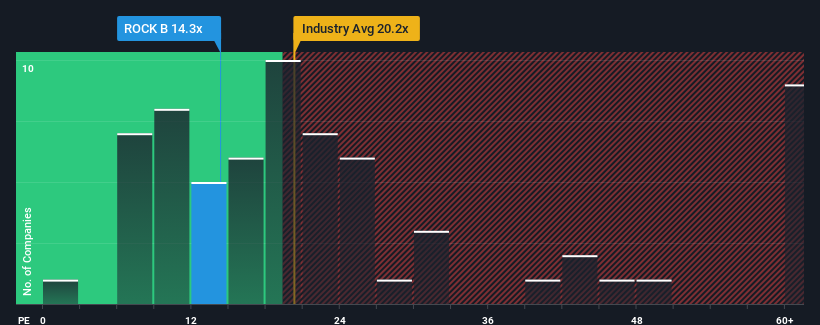Unpleasant Surprises Could Be In Store For Rockwool A/S' (CPH:ROCK B) Shares
With a median price-to-earnings (or "P/E") ratio of close to 14x in Denmark, you could be forgiven for feeling indifferent about Rockwool A/S' (CPH:ROCK B) P/E ratio of 14.3x. While this might not raise any eyebrows, if the P/E ratio is not justified investors could be missing out on a potential opportunity or ignoring looming disappointment.
With earnings growth that's superior to most other companies of late, Rockwool has been doing relatively well. It might be that many expect the strong earnings performance to wane, which has kept the P/E from rising. If not, then existing shareholders have reason to be feeling optimistic about the future direction of the share price.
View our latest analysis for Rockwool

What Are Growth Metrics Telling Us About The P/E?
In order to justify its P/E ratio, Rockwool would need to produce growth that's similar to the market.
If we review the last year of earnings growth, the company posted a terrific increase of 32%. The strong recent performance means it was also able to grow EPS by 72% in total over the last three years. Therefore, it's fair to say the earnings growth recently has been superb for the company.
Shifting to the future, estimates from the twelve analysts covering the company suggest earnings should grow by 1.4% over the next year. Meanwhile, the rest of the market is forecast to expand by 19%, which is noticeably more attractive.
In light of this, it's curious that Rockwool's P/E sits in line with the majority of other companies. It seems most investors are ignoring the fairly limited growth expectations and are willing to pay up for exposure to the stock. Maintaining these prices will be difficult to achieve as this level of earnings growth is likely to weigh down the shares eventually.
What We Can Learn From Rockwool's P/E?
It's argued the price-to-earnings ratio is an inferior measure of value within certain industries, but it can be a powerful business sentiment indicator.
Our examination of Rockwool's analyst forecasts revealed that its inferior earnings outlook isn't impacting its P/E as much as we would have predicted. When we see a weak earnings outlook with slower than market growth, we suspect the share price is at risk of declining, sending the moderate P/E lower. This places shareholders' investments at risk and potential investors in danger of paying an unnecessary premium.
We don't want to rain on the parade too much, but we did also find 1 warning sign for Rockwool that you need to be mindful of.
If these risks are making you reconsider your opinion on Rockwool, explore our interactive list of high quality stocks to get an idea of what else is out there.
New: AI Stock Screener & Alerts
Our new AI Stock Screener scans the market every day to uncover opportunities.
• Dividend Powerhouses (3%+ Yield)
• Undervalued Small Caps with Insider Buying
• High growth Tech and AI Companies
Or build your own from over 50 metrics.
Have feedback on this article? Concerned about the content? Get in touch with us directly. Alternatively, email editorial-team (at) simplywallst.com.
This article by Simply Wall St is general in nature. We provide commentary based on historical data and analyst forecasts only using an unbiased methodology and our articles are not intended to be financial advice. It does not constitute a recommendation to buy or sell any stock, and does not take account of your objectives, or your financial situation. We aim to bring you long-term focused analysis driven by fundamental data. Note that our analysis may not factor in the latest price-sensitive company announcements or qualitative material. Simply Wall St has no position in any stocks mentioned.
About CPSE:ROCK B
Rockwool
Produces and sells stone wool insulation products in Western Europe, Eastern Europe, Russia, North America, Asia, and internationally.
Flawless balance sheet established dividend payer.
Similar Companies
Market Insights
Community Narratives



